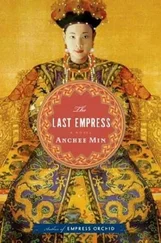S. Turney - Dark Empress
Здесь есть возможность читать онлайн «S. Turney - Dark Empress» весь текст электронной книги совершенно бесплатно (целиком полную версию без сокращений). В некоторых случаях можно слушать аудио, скачать через торрент в формате fb2 и присутствует краткое содержание. Жанр: Фэнтези, на английском языке. Описание произведения, (предисловие) а так же отзывы посетителей доступны на портале библиотеки ЛибКат.
- Название:Dark Empress
- Автор:
- Жанр:
- Год:неизвестен
- ISBN:нет данных
- Рейтинг книги:5 / 5. Голосов: 1
-
Избранное:Добавить в избранное
- Отзывы:
-
Ваша оценка:
- 100
- 1
- 2
- 3
- 4
- 5
Dark Empress: краткое содержание, описание и аннотация
Предлагаем к чтению аннотацию, описание, краткое содержание или предисловие (зависит от того, что написал сам автор книги «Dark Empress»). Если вы не нашли необходимую информацию о книге — напишите в комментариях, мы постараемся отыскать её.
Dark Empress — читать онлайн бесплатно полную книгу (весь текст) целиком
Ниже представлен текст книги, разбитый по страницам. Система сохранения места последней прочитанной страницы, позволяет с удобством читать онлайн бесплатно книгу «Dark Empress», без необходимости каждый раз заново искать на чём Вы остановились. Поставьте закладку, и сможете в любой момент перейти на страницу, на которой закончили чтение.
Интервал:
Закладка:
S. J. A. Turney
Dark Empress
Prologue
If, in her later years, Asima described to someone the town where she grew up, which of course she wouldn’t, she would have been spoiled for adjectives. M’Dahz was the last Imperial town before the Pelasian border and, as such, shared more of the characteristics of their swarthy mysterious people than of the great culture of the Empire. It was a border garrison, a mercantile port, trading post, and caravanserai.
It smelled of spice and of sweat; of work animals and of sweet meats; of the sea and of the desert. It was a meeting of every world and a clash of mouth and eye-watering noises, sights and aromas. It was a maze of narrow streets and alleys, the ramshackle adobe houses often kept from toppling outwards by the heavy wooden struts that were jammed from side to side above head height throughout most of the town. To ward off the worst heat of the day and the periodic cloying sandstorms from the south, the people hung rugs over the beams, turning the alleyways into stygian tunnels and creating a labyrinth.
With the exception of the main thoroughfare that ran from the port to the Bab Ashra, the Desert Gate, the only part of M’Dahz that felt open and fresh was the palace compound, forbidden to all bar nobles, dignitaries and the military. A small and well-tended garden surrounded by elegant balconied residences, the compound presented a solid wall, free of windows, to the outside, shunning the dirty, smelly, noisy town that teemed with life.
The whole town sloped downwards from the desert to the sea, and it was said that a man could walk the streets of M’Dahz for a week without finding a road free of steps. It wasn’t true, of course, but such streets were indeed rare, and every town has to have its little foibles after all. The town was self-styled as the ‘Southern Bastion of the Empire’ though in truth as much Pelasian or desert nomad blood pumped in the veins of its people as that of the Empire. And as for ‘bastion’? Well the town had its walls, along with three grand gates, but the walls had long been abandoned as a defensive perimeter and more often served as the rear wall of a house than a barrier to potential attackers. In fact, for almost a third of their length the walls were now buried deep inside the town itself, invisible without requesting entrance to peoples’ houses.
Space was at a premium in M’Dahz. Everything clustered together as close to the centre as possible, like a pile of broken pots, as the people tried to distance themselves from the outskirts where the dust piled up at the foot of walls and the sand had to be swept daily from the streets. There was certainly no park or garden; no green space; no fields or orchards. But then everything the people needed came from trade: dates and fruit and meat brought by caravan from the oases inland, or grains and meats by ship from Pelasia and the great Imperial cities.
People who visited asked merchants how anyone could live in the conditions they encountered at M’Dahz. But then the merchants would arch their eyebrow and ask in a concerned voice how anyone could consider living anywhere else. M’Dahz was dirty, noisy, smelly, at constant risk of sandstorm, barren and dry. But M’Dahz was life in its rawest form.
Asima would never speak of these things, or how she began as the daughter of a humble seller of animal feeds before her rise to courtesan, concubine, and finally Empress.
Part One: Childhood’s End
In which journeys are started
They were seven years old when Asima first began to notice a change in the way the boys looked at her. It was not the lust, desire or hunger she would so often encounter later in life, but rather an indefinable need to be near her and to seek out her attention and approval. She would find in the coming days that she enjoyed their attention, but on that first day it surprised her, particularly given the strange timing that exhibited a subtle shift in the attitude of both boys, apparently independently.
It was a summer afternoon in M’Dahz, though only a local would have noticed much difference between the seasons in this arid, searing land. The heat was already unbearable to most folk and only children, slaves and the duty-bound were in evidence beneath the fiery orb of the sun. The noise of the town was muffled as it rose from the stifled and shady alleyways beneath their coverings of rugs and blankets. A distant gong announced the call to temple for the faithful of the Pelasian divinity, but the subsequent clangs were lost among the noise of a town where life continued apace beneath the shady covers.
Asima turned to Samir, shading her eyes from the worst of the glare. The smaller of the two boys, Samir held the attention of girls older than he. There was something about that face, the way his mouth turned up slightly at the corners as though he wore a permanent knowing smile. There was a delightful, if wicked, twinkle in his eye at all times, and his bronzed skin and short, straight black hair were smooth, neat and perfectly complemented his fine oval face. His clothes, for some reason, looked stylish and carefully chosen, despite the fact that Asima knew that they were little more than rags; hand-me-downs from distant friends of his mother, washed so many times they had lost all shape and colour. And yet something about the way he wore them made them look princely.
Samir smiled and winked as he dropped into a crouched position, his muscles bunched and his tendons twanging. Asima nodded and turned to her other side. Ghassan was already is position as he turned to smile at her. Samir’s brother was, while officially a twin, nothing like his smaller sibling. This was good according to the traditions of the desert people from whom the boys’ paternal line had sprung. Twins who were too similar were bad luck; bad magic. It was not unknown for the nomads to leave children to die in the sands because of their tragic similarity; but Ghassan was different, for sure.
Already a head taller, Ghassan had a slight curl to his hair and some parts of it jutted out in random directions. No matter how much their mother flattened, brushed, waxed or washed it, parts of Ghassan’s hair were untameable. His skin was marked from an illness as a baby and yet the marks did not make him ugly or ruin his appearance; somehow, the imperfections added to the rugged power of his appearance and lent him a gravity he would otherwise have lacked. Where Samir’s mouth turned up to a smile, Ghassan’s was straight and flat, his expression serious. He was handsome in a way that appealed to some of the girls of M’Dahz, and mothers nodded sagely as they foresaw an eminently marriageable boy there. And yet, somehow, while Ghassan’s clothes were almost identical to Samir’s, on the taller boy they hung like badly sewn bags. Asima almost laughed as she nodded and faced forward, dropping to a crouch herself.
The girl was already pretty and was coming to realise it even at this young age. She had perfect skin, with a creamy texture that required surprisingly little upkeep, though her father chided her anyway for the amount of time she spent primping. Her almond eyes were beautiful, dark and warm, her lips a perfect bow. Her hair was long and carefully combed and pinned back, never cut more than a shaping trim as was the tradition of the Pelasians, for Asima had Pelasian blood on her mother’s side. The only fault that marred her appearance in any way was her fingernails. Her mother, before she had passed last winter, had disciplined her repeatedly for the damage she was doing biting her nails down to the quick, though it had never stopped her. She was dressed, in a manner that would cause her father’s heart to skip a beat, in just a white cotton vest and knee length trousers of the same thin material, her feet bare and her sparse jewellery removed and lying on the pile of more acceptable clothing by her feet.
Читать дальшеИнтервал:
Закладка:
Похожие книги на «Dark Empress»
Представляем Вашему вниманию похожие книги на «Dark Empress» списком для выбора. Мы отобрали схожую по названию и смыслу литературу в надежде предоставить читателям больше вариантов отыскать новые, интересные, ещё непрочитанные произведения.
Обсуждение, отзывы о книге «Dark Empress» и просто собственные мнения читателей. Оставьте ваши комментарии, напишите, что Вы думаете о произведении, его смысле или главных героях. Укажите что конкретно понравилось, а что нет, и почему Вы так считаете.












